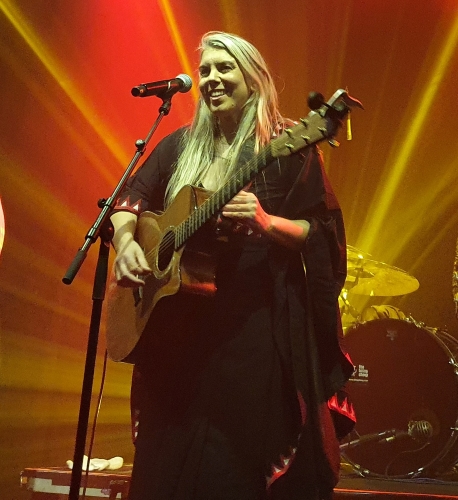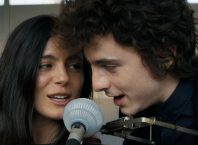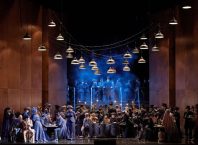Yael Deckelbaum shines like the sun, warm and powerful, her voice and presence bring light wherever she goes, she is radiant. A talented singer and songwriter, Deckelbaum launched her latest record – What About the Women – at the Gagarin in Tel Aviv on Wednesday, December 7th to a full house of enthusiastic fans. The album, produced by Ronen Sabo and Adam Ben Amitai, marks a significant chapter in Deckelbaum’s work as a musician and activist for peace, that began in 2016 when she composed the song Prayer of the Mothers to support the movement Women Wage Peace (WWP). The song soon became an anthem and a rallying cry, and over the past several years, in the tradition of musician/activists such as Pete Seeger, Joan Baez, and Holly Near, Deckelbaum has not only been singing the song for peace, but walking the walk – literally. Her projects have brought women together in musical collaborations that traverse borders of language, nationality, and religion, marching and performing worldwide, singing their message of peace.

Performing with a terrific band – Karen Teperberg (drums), Nitzan Alon (electric guitar), Eli Or (bass), Maayan Linik (keyboards), Deckelbaum hosted a bevy of exciting musical guests in a concert that was a reunion and a celebration. She opened the evening with Home, the first track on Yael and the Mothers, an EP released in 2017 with her ensemble of Arabic and Jewish women, that includes live and studio recordings of songs from their work together. It’s refrain a rhythmic chant that was taken up by the crowd, Home, like many of Deckelbaum’s songs from this period, is a song you can march to. Joining Deckelbaum for the next song was Meera Eilabouni, and together they sang Hayati (the word means “my life” in Arabic, and is a term of affection, like “my love”), a beautiful duet in English and Arabic, that speaks of overcoming barriers to arrive at “a place where we can meet”. Deckelbaum’s songs do not only protest war, and speak against violence, they reach out with a message of hope, looking towards all the good that can come. Images of light, the sun and the sky fill these songs with warmth and joy.
Introducing the album’s title track, What About the Women, Deckelbaum invited the audience to sing the refrain, although it was already clear that this audience, knowing and loving the songs, needed no formal invitation, and had been singing along softly from the beginning. Asking the crowd to “sing stronger” Deckelbaum emphasized the inclusivity of her work, saying that a women’s revolution is a human revolution, and for one go asked that just the men in the audience sing the refrain: “What about the women?” A rousing protest song infused with reggae rhythms What About the Women is a song for dancing revolutions, the kind I think Emma Goldman would have liked.
Many of the songs on this album (and from this chapter in Deckelbaum’s work) draw on mothers and the work of mothering as a symbol, as givers, nurturers, and protectors of life. The song Knit the Net, the 8th track on the album, inscribes itself in women’s history, the knowledge and crafts traditionally associated with women, such as knitting, to create an image of women connecting across the globe. It’s a song that begins slow and quiet, then rises to a crescendo with the powerful image of lionesses. Deckelbaum emanates a strong force, even when she sings sweet and soft, and when she releases its full power, its beauty is transcendent.
In the spirit of glorious voices that can power a movement, Deckelbaum’s surprise guest for the evening was Shai Tsabari. Together they sang a favorite song of mine, Ahuva Ozeri’s Mealai Dmama, which feels, as the best covers do, like it was written for Tsabari to sing. Love and energy surged through the night – from the performers onstage to the audience, and from the crowd to the musicians, in a never-ending flow. Next they sang the stirring Warriors of Peace, which was recorded on the album with Joss Stone.
Although naturally, much of Deckelbaum’s work in song and activism centers on Arab-Jewish and Israeli-Palestinian relations, her reach is wide, connecting with women’s activism and issues globally. The wonderful Ester Rada joined Deckelbaum for the song Freya, a heart-wrenching conversation between a mother and her 13-year-old daughter who pleads not to be sold in marriage. Yet another song, which was not performed in the concert, is Song for Standing Rock, which reaches out to the courageous women who protested the Dakota Access Pipeline which crosses beneath the Missouri and Mississippi Rivers, as well as under part of Lake Oahe near the Standing Rock Indian Reservation.
Coming back to a playful, lighter mood, Deckelbaum joined in on Ester Rada’s song of fun philosophy Life Happens. At this point in the standing-room-only concert, Deckelbaum advised her audience, “If you’re finding it hard to stand, don’t stand – dance!” Alone again onstage (but not for long), she sang 100% Light from her first solo album Ground Zero, and towards the end of the song was joined by her bandmates from Habanot Nehama – Karolina and Dana Adini. If you thought the mood in the Gagarin couldn’t get higher, think again. As they joined their voices in harmony, singing several of their signature songs – Lovers, Hakol Kashura, Lies and So Far – an audience of fans sang along.
Some performers are uniquely gifted at bringing people together, and Yael Deckelbaum possesses that gift in abundance. As the audience bid a fond farewell to Karolina and Adini, and the band returned to the stage, Deckelbaum welcomed the women of WWP and invited them to bring their giant banner to the front, while she, jumped off the stage and stood in the center of a circle of people, all singing together War is Not a Woman’s Game. Deckelbaum was back onstage for Take Me Home, its bouncy country feel swirling out to Middle Eastern tones and rhythms, celebrating individuality and togetherness.
For her encore, Deckelbaum performed solo, singing Orion, an acoustic love song, a lovely offering from her upcoming album. Bringing it all together, the band and Daniel Rubin came out to join Deckelbaum, closing the evening with the Prayer of the Mothers, as everyone sang together: “Bring them peace.”
Links: https://www.facebook.com/YaelDeckelbaum; https://nanadisc.lnk.to/WhatAbout
Women Wage Peace: https://www.womenwagepeace.org.il/en/
Enjoy the video for War is Not a Woman’s Game made with the participation of women worldwide





